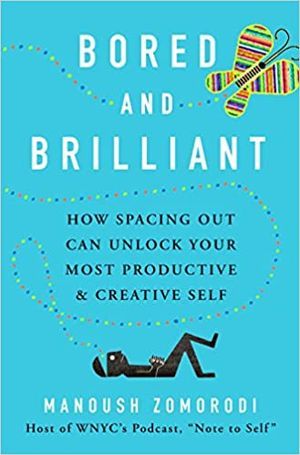This content contains affiliate links. When you buy through these links, we may earn an affiliate commission.
Getting up from my chair and walking away from the computer during the day is a practice I, and too many others, have to work hard at. Reading about how 996 culture (a 9 a.m. to 9 p.m., six-days-a-week work schedule) has taken hold of a new generation of Silicon Valley techies, inspired by China’s workforce, is enough to tell you the kids aren’t alright when it comes to work-life balance. But then, what generation of Americans has been? Success and productivity has long looked like hustling hard, and who has room for breaks when you have a thousand boxes to tick and connections to make. Enter today’s recommendation. If you need someone to tell you, “Take a deep breath and step away from all of the screens,” and to explain in simple terms why this practice is key to success, specifically if ideating is part of your personal or professional work, then read this book.

Bored and Brilliant: How Spacing Out Can Unlock Your Most Productive and Creative Self by Manoush Zomorodi
The subtitle of Manoush Zomorodi’s book tells you exactly what this book is about, though the focus isn’t just about spacing out but also about reducing your screen time. This book is not unlike a good deal of other self improvement books I’ve read, offering fairly practical, common sense advice that seems obvious on its face, but it’s one of few of these books that resurfaces again and again like a helpful mantra convincing me to disrupt muscle memory and touch grass, or really anything other than my phone. Manoush Zomorodi’s message is simple but increasingly urgent in the age of the attention economy where our mental bandwidth has become a desirous commodity for everyone from influencers to politicians to claim. Zomorodi is conversational and tends to the question of what happens to our minds when we let them wander with genuine curiosity, which made for a pleasant and approachable reading experience.
Agatha Christie plotted her books while doing mindless activities like washing the dishes and eating apples in the bathtub (weird, but I won’t knock it), but Christie didn’t have Instagram and TikTok. She didn’t have hundreds of emails to process each morning. She didn’t have thousands of hours of YouTube content at her fingertips or the ping of Slack messages calling her back to the desk. Look around any public space and note the number of people with their heads down, eyes locked on their phones. When I’m bored or listless I, too, instinctively turn to my phone for stimulation and distraction. But my best ideas arrive when I’m doing something random, most often away from my phone or laptop, and Zomorodi offers practical tips to improve one’s relationship with the digital world and create more breathing room for the brain.
In Reading Color
A weekly newsletter focusing on literature by and about people of color!
The comments section is moderated according to our community guidelines. Please check them out so we can maintain a safe and supportive community of readers!
